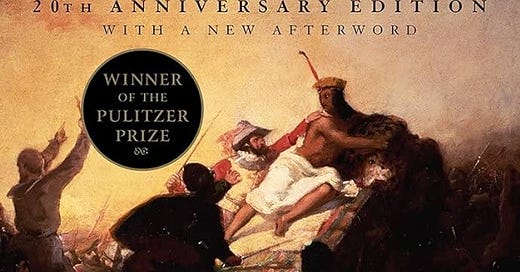Book Review: Guns, Germs, and Steel
understanding the history of human societies and the winners and losers
I first got to know about the existence of this book when David Deutsch mentioned it in “The Begining of Infinity”. As a history buff, I just had to pick this up because I found the premise interesting and I wanted to get some understanding of the differences in how different civilisations progressed.
He starts with a brief overview of human evolution and history up to 11,000 BC, this is where complex societies started to form. Despite Africa's head start in human evolution, there was no clear advantage for any continent at this time. So the premise or the question becomes, “Why did Eurasia end up taking the lead and progressing much faster than others and even colonised others? Why weren’t the other continents the ones who took the lead?”. The rest of the book is an exploration of how and why this happened.
Some takeaways from the book for me
Geographical orientation's impact. Eurasia had an advantage because of the East-west axis. Similar latitudes tend to have similar climates, so it is easier to spread agriculture and technology.
Domestication of plants and animals played a crucial role in societal development. Eurasia had a larger number of domesticable species.
Transitioning from hunter-gatherer societies to agricultural societies was an important step.
Food production helped foster innovation. It can stem from curiosity and tinkering not just necessity, which some societies could afford.
Larger populations supported by agriculture led to complex social organizations like states. Also, non-food-producing specialists can focus on other things.
Writing became important for complex societies and was pivotal for European dominance. (recently read somewhere that the Chinese couldn’t make use of the writing invention centuries before because the Chinese alphabet was not suitable for the moving printing head, whereas English was perfect for this, another stroke of luck for Europe)
Humans also got diseases because of their proximity to the domesticated animals.
Germs. Spanish Conquest of Native Americans was brutal. Powerful kingdoms were eradicated because of the diseases.
Collision of worlds via European exploration and colonization.
China has long stayed unified for a lot of centuries. (I gotta read more about Chinese history)
The African continent had a lot of environmental challenges.
Also, this book gave a new perspective on the recent decolonisation debate and how it’s more complex than what might seem on the surface.
I recall Deutsch's criticism in his book was that Diamond underplayed the agency of ancient societies' inhabitants and how unlocking certain knowledge could have propelled them forward. I somewhat agree with this point.
A friend told me about the criticism of this book and I looked them up. They are on similar lines of what Deutsch was saying. How his theories paint the indigenous populations as passive victims instead of active participants in their histories. I kinda agree with this criticism but also I feel that in some scenarios, the geographical factors were probably too overpowering. Also, I agree that he somewhat tried to oversimplify the historical events. I thought there was some hindsight bias for sure in his evaluation.
Overall, even with its criticisms, I felt like this book gave me a useful perspective on the evolution of societies. And it also made me want to read more history books.




